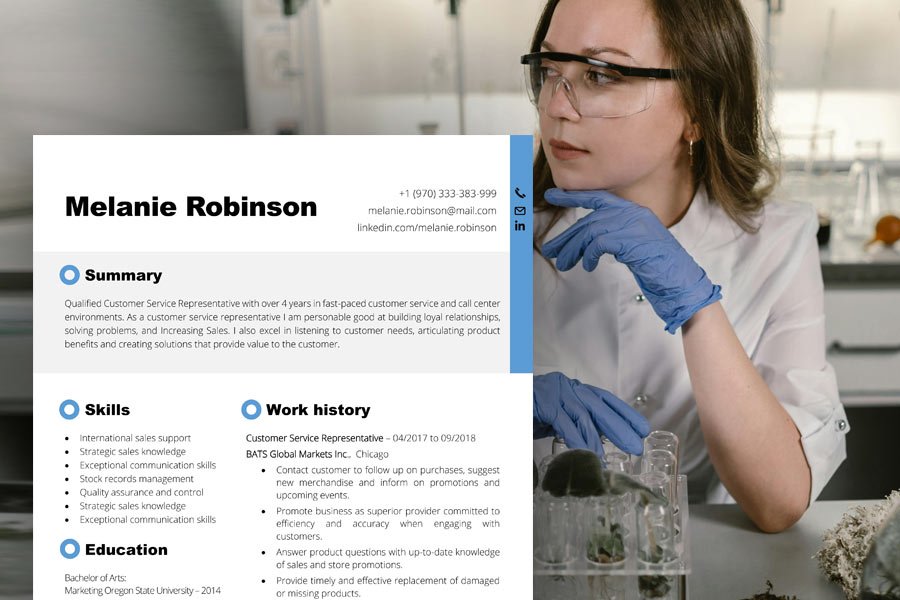
Biotechnology, a rapidly advancing field at the intersection of biology and technology, offers a myriad of opportunities for professionals seeking to make a meaningful impact on healthcare, agriculture, environmental conservation, and beyond. Central to this realm is the role of the biotechnologist, a versatile and dynamic position that encompasses a range of responsibilities. In this article, we delve into what biotechnologists do, the educational path to enter this field, and the key elements of a biotechnologist’s resume.
What Does a Biotechnologist Do?
Biotechnologists are instrumental in applying biological principles and techniques to develop products and processes that benefit society. Their work spans various industries, including pharmaceuticals, food production, renewable energy, and environmental conservation. Here are some common tasks and responsibilities associated with the role:
- Research and Development: Biotechnologists engage in research to understand biological systems, develop new technologies, and discover novel applications. This may involve studying genetic mechanisms, manipulating DNA, or investigating biochemical pathways.
- Product Development: Biotechnologists contribute to the design, development, and improvement of biotechnological products such as vaccines, drugs, genetically modified organisms (GMOs), and biofuels. They are involved in every stage of product development, from conceptualization to commercialization.
- Quality Control: Ensuring the safety, efficacy, and quality of biotechnological products is paramount. Biotechnologists conduct rigorous testing and analysis to validate product performance, adherence to regulations, and compliance with industry standards.
- Bioprocess Optimization: In industries like pharmaceuticals and biomanufacturing, biotechnologists optimize bioprocesses to enhance efficiency, yield, and scalability. This involves optimizing fermentation conditions, designing bioreactors, and implementing automation technologies.
- Ethical and Regulatory Compliance: Biotechnologists navigate complex ethical, legal, and regulatory frameworks governing the use of biotechnology. They must stay abreast of evolving regulations and ensure that their work aligns with ethical principles and industry standards.
What Is the Education for the Position of Biotechnologist?
The educational requirements for becoming a biotechnologist typically involve obtaining a bachelor’s degree, although advanced positions may require a master’s or doctoral degree. Here’s an overview of the educational path:
- Bachelor’s Degree. Many entry-level positions in biotechnology require a bachelor’s degree in biotechnology, biology, biochemistry, microbiology, or a related field. Coursework typically includes molecular biology, genetics, bioinformatics, bioprocessing, and laboratory techniques.
- Master’s Degree. Pursuing a master’s degree in biotechnology or a specialized field can provide advanced knowledge and skills, enhancing career prospects and opportunities for leadership roles. Master’s programs often include research projects or internships to gain practical experience.
- Doctoral Degree (Ph.D.). For those aspiring to pursue research-intensive or academic careers, obtaining a Ph.D. in biotechnology or a related discipline is advisable. Doctoral studies involve conducting original research, publishing scientific papers, and contributing to the advancement of knowledge in the field.
- In addition to formal education, gaining hands-on laboratory experience, participating in internships or co-op programs, and acquiring relevant certifications can bolster one’s credentials and competitiveness in the job market.
The Most Important Elements of a Biotechnologist’s Resume
Crafting a compelling resume is essential for showcasing your qualifications, skills, and experiences as a biotechnologist. Here are some key elements to include:
- Use a ready-made resume template to write your resume. Check resume remplates to download.
- Technical Skills. Emphasize your proficiency in laboratory techniques, instrumentation, and software relevant to biotechnology. This may include PCR, gel electrophoresis, cell culture, chromatography, bioinformatics, and statistical analysis.
- Research Experience. Detail your research projects, including objectives, methodologies, results, and contributions. Highlight any publications, presentations, or patents resulting from your research endeavors.
- Work Experience. Provide a comprehensive overview of your professional experience, including internships, co-op placements, and full-time positions. Describe your roles, responsibilities, achievements, and contributions to projects or teams.
- Certifications and Training. If applicable, mention any certifications, licenses, or specialized training relevant to biotechnology, such as Good Laboratory Practices (GLP), Good Manufacturing Practices (GMP), or biosafety certifications.
- Soft Skills. Highlight your interpersonal skills, problem-solving abilities, teamwork, communication skills, and adaptability. These qualities are essential for success in collaborative research environments and industry settings.
- References. Include references from professors, supervisors, or colleagues who can attest to your qualifications, work ethic, and character. Obtain permission from individuals before listing them as references.
A career as a biotechnologist offers exciting opportunities to leverage cutting-edge science and technology for the betterment of society. By pursuing a relevant education, gaining practical experience, and cultivating essential skills, aspiring biotechnologists can position themselves for success in this dynamic and rewarding field. Crafting a well-crafted resume that highlights your qualifications and achievements is crucial for securing employment opportunities and advancing your career in biotechnology.
Read More About Indeed Jobs: Your Gateway to Career Opportunities
